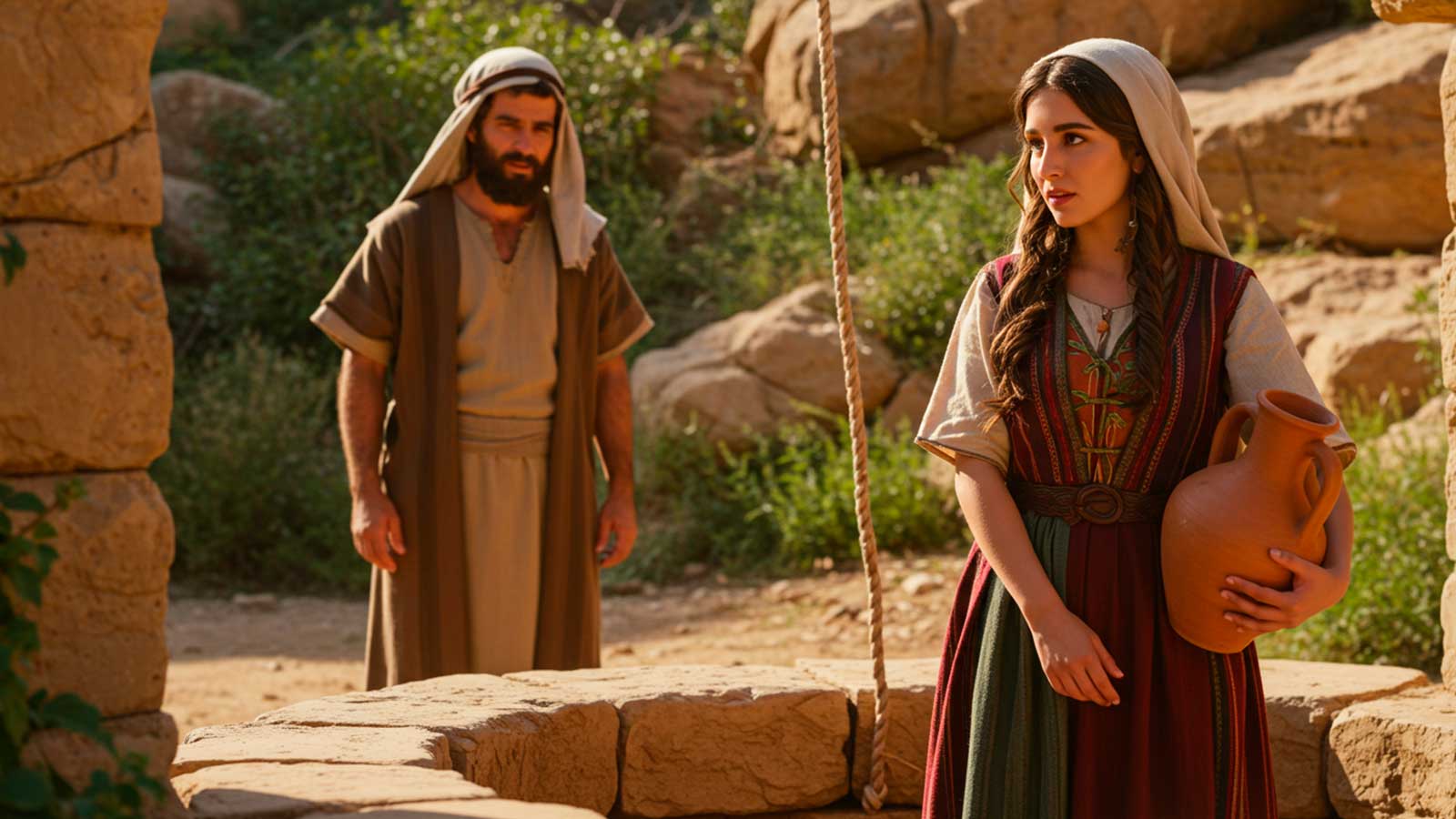Genesis 29:20 is a Bible verse that carries a profound message about love, dedication, and perseverance. It recounts how Jacob worked seven years for Rachel, yet that time seemed like only a few days to him because he loved her deeply.
This passage goes beyond a romantic story; it reveals the essence of patience and the commitment that true love demands. In this article we will explore the context of Genesis 29:20, the meaning behind the verse, practical lessons, and how it can still inspire people today.
²⁰ So Jacob served seven years for Rachel, and they seemed to him but a few days because of the love he had for her.
Genesis 29:20
The Historical Context of Genesis 29:20
Genesis 29:20 is part of the narrative in which Jacob, after fleeing his parents’ home, meets Rachel and falls in love at first sight. He arrives at the house of Laban, his uncle, and agrees to work seven years to have Rachel as his wife. Such negotiations were common in that culture, where marriages involved family agreements and financial or labor compensation.
Jacob, who had already experienced conflict with his brother Esau, finds in Rachel a new purpose and motivation to build his life. The way he approaches the seven years of work teaches a powerful lesson: when love is genuine, even the greatest sacrifices become easy.
Why did the seven years seem like only a few days?
The verse highlights that, despite the long period, the days passed quickly because Jacob’s love for Rachel was sincere. This shows how dedication, when driven by a greater purpose, turns effort into something bearable and even enjoyable.

The Spiritual Meaning of Genesis 29:20
Beyond its historical importance, Genesis 29:20 carries a valuable spiritual message. It teaches us about patience, perseverance, and the worth of fighting for what truly matters. The verse is also a reminder that solid relationships require effort and commitment.
This passage can also be viewed as a metaphor for each person’s spiritual journey. Just as Jacob worked diligently for Rachel, believers are called to persevere in their walk with God, knowing that the ultimate reward outweighs the wait.
A lesson on voluntary sacrifice
Jacob was not forced to work; he freely chose to devote years of his life to win what he loved. This shows that true love is accompanied by conscious actions and choices, not merely words or fleeting feelings.
Genesis 29:20 and Its Connection to Other Bible Verses
Genesis 29:20 links to other passages about love and perseverance. For example, 1 Corinthians 13 describes love as patient and kind—qualities reflected in Jacob. In addition, Proverbs often praises diligence and effort in every area of life.
This connection shows that the verse is not just an isolated story but part of a larger message present throughout the Bible.
Comparison with sacrificial love
Another interesting parallel can be drawn with Christ’s love, which also involves sacrifice and self‑giving. Although the contexts differ, both examples show how genuine love expresses itself through concrete actions.
Practical Lessons from Genesis 29:20 for Today
Though written thousands of years ago, Genesis 29:20 remains timely. It teaches that great achievements—especially in love and relationships—require effort, patience, and dedication. In a world marked by haste and instant gratification, this lesson is more relevant than ever.
How to apply this teaching in relationships
Couples can learn from Jacob and Rachel that solid relationships are not built instantly. It is necessary to invest time, energy, and commitment so that love can blossom and remain strong over the years.
Lessons for other areas of life
The principle of perseverance also applies to other areas, such as career, studies, and personal dreams. Just as Jacob worked for years to achieve his goal, many important accomplishments demand patience and constancy.

Reflection on Love That Transforms
The love described in Genesis 29:20 is not merely a feeling but a force that transforms how we experience time and challenges. When love is genuine, even the longest sacrifices become bearable, and the focus shifts to the reward and joy that will come.
The difference between passion and true love
This passage also leads us to reflect on the difference between fleeting passion and enduring love. Jacob not only felt attracted to Rachel but proved his love through years of dedication, showing that true love goes beyond momentary emotions.
The Role of Laban in the Story
To better understand Genesis 29:20, it is also important to consider Laban’s role. As Jacob’s uncle and Rachel’s father, he set the marriage conditions but also deceived Jacob by giving him Leah before Rachel. This further prolonged Jacob’s journey and added a dimension of perseverance and resilience to the story.
A lesson on trust and challenges
Laban’s attitude reminds us that, even when we have a clear purpose, obstacles and disappointments can arise. Still, Jacob persisted, demonstrating that perseverance can overcome injustice and unexpected difficulties.

FAQ about Genesis 29:20
What is the main message of Genesis 29:20?
The central message is that true love inspires patience and sacrifice, making challenges lighter and more bearable.
How can Genesis 29:20 be applied to modern relationships?
The verse teaches that lasting relationships require commitment, patience, and effort—qualities that remain essential today.
Why did Jacob work for Rachel?
He fell in love with Rachel and made an agreement with Laban to work seven years as payment for the marriage, something common at the time.
What is the verse’s connection to spiritual perseverance?
Just as Jacob persevered for Rachel, believers are called to persevere in their faith, trusting that the reward is worth every effort.
READ ALSO:
- Exodus 1: How the Liberation of the Hebrew People Begins
- Genesis 27: The Deception of the Blessing and Its Consequences
- Ark of the Covenant: 7 Facts to Understand Everything
- Exodus 25:18: The Profound Meaning of the Cherubim on the Ark of the Covenant
FOLLOW US ON FACEBOOK
I hope this has helped.